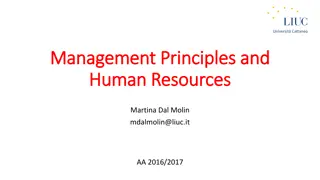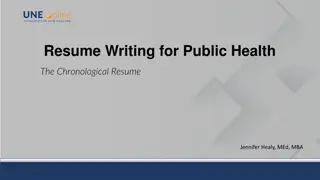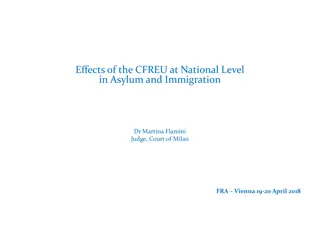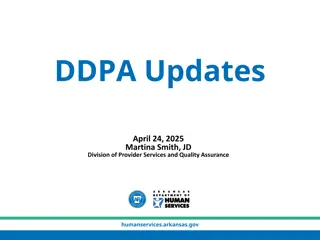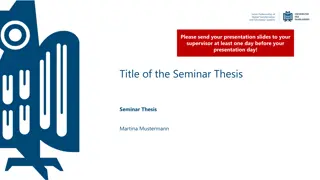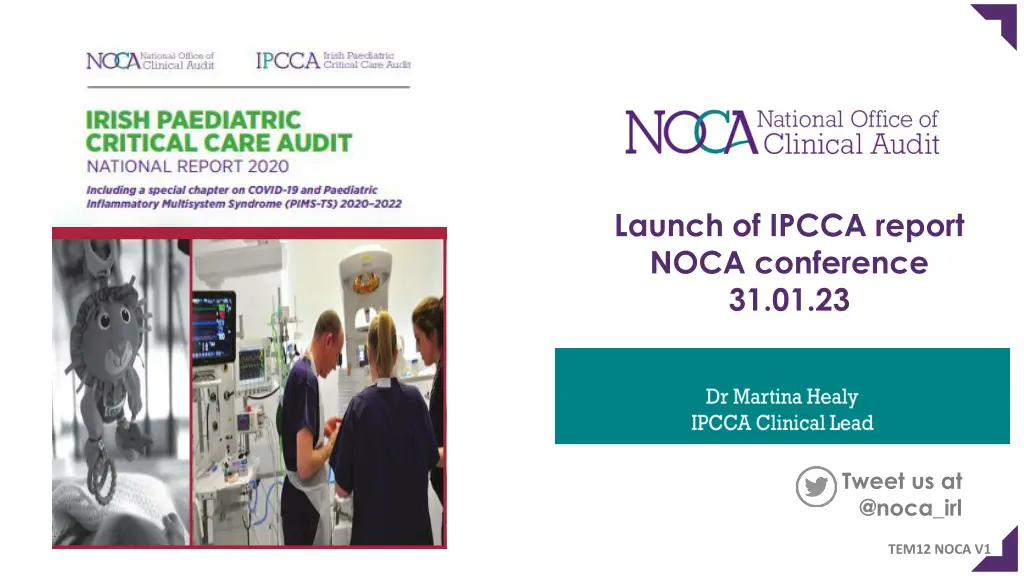
Insights from Paediatric Critical Care Units in Ireland 2020 Analysis
Explore key findings from the PICANet, INICUA-ICNARC, and HPSC datasets related to admissions, bed days, patient demographics, and care metrics in Irish Paediatric Critical Care Units in 2020. Discover trends, challenges, and improvements in critical care for children and young people in Ireland.
Download Presentation

Please find below an Image/Link to download the presentation.
The content on the website is provided AS IS for your information and personal use only. It may not be sold, licensed, or shared on other websites without obtaining consent from the author. If you encounter any issues during the download, it is possible that the publisher has removed the file from their server.
You are allowed to download the files provided on this website for personal or commercial use, subject to the condition that they are used lawfully. All files are the property of their respective owners.
The content on the website is provided AS IS for your information and personal use only. It may not be sold, licensed, or shared on other websites without obtaining consent from the author.
E N D
Presentation Transcript
Launch of IPCCA report NOCA conference 31.01.23 Tweet us at @noca_irl TEM12 NOCA V1
Data Included 1. PICANet dataset: All children and young people accepted for referral, transported or admitted to designated paediatric intensive care units (PICUs) providing paediatric Level 3 Critical Care in Ireland during 2020. Aggregate data from 2018-2020 included for trend analysis. 2. INICUA - ICNARC dataset: All children and young people admitted to adult ICUs across the Republic of Ireland in 2020. 3. HPSC dataset: All children and young people with a COVID-19+/PIMS-TS diagnosis cared for in PCCUs in ROI from March 2020 July 2022.
Key Findings The totalnumber of admissions of patients to Paediatric Critical Care Units (PCCUs) in 2020 (including children aged 16 years or over) in the Republic of Ireland (ROI) was 1399, a decrease of 9% from 2019 (n=1514). The total number of admissions of patients to PCCUs in the UK and ROI for 2020 (n=16429) decreased by 19% (n=3854) from 2019. CHI at Crumlin had the third-highest number of PCCU admissions (n=968) of all Units in the UK and ROI. The ROI rate of admissions was 121.3 per 100,000 population (a decrease from 133.4 in 2019) and is the second- highest rate after Scotland (136.4), the country with the highest rate. Just over one-half, 52% (n=725) of admissions were unplanned in 2020 (a 10% decrease from 2018). Forty-one percent (n=565) of admissions were following surgery (a 10% increase from 2018).
Key Findings Ten percent (n=444) of patient discharges and 34% (n=1507) of patient admissions occurred Out of Hours (20:00-07:59) during 2018-2020. The number of bed days delivered in ROI in 2020 was 9312 (a decrease of 1,000 bed days from 2019) CHI at Crumlin delivered 7101 bed days and CHI at Temple Street delivered 2211 bed days. Infants aged under one year occupied 68% the of bed days delivered in 2020. The annual average rate of unplanned extubation per 1,000 intubated days in 2020 was 2.5 per 1,000 in the ROI (a decrease from 4.2 per 1000 in 2019) and below the acceptable threshold of 5.0 per 1000. Seventy percent of patients received vasoactive medication while in PCCU. There were 25 ECMO runs in 2020 (an increase from 18 in 2018, 22 in 2019).
No. of admissions = 968 58% aged under one year Bed days delivered = 7101 No. of admissions = 401 37% aged under one year Bed days delivered = 2211
Key Metrics Timeliness of data submission 2020: The completeness of patients admission data within 3 months of their discharge from the Unit was 48% forCHI at Crumlin and 85% for CHI at Temple St. The target is 100%. Retrieval mobilisation times 2020: 71% of Irish Paediatric Acute Transport Service (IPATS) journeys to retrieve patients for transfer to PCCU were started within the recommended one hour (18% 0-30mins, 53% 31-60mins). Number of qualified nurses per bed 2020: The recommended standard for nursing levels is 5.5 whole-time equivalent (WTE) nurses per critical care bed. CHI at Crumlin 5.82 WTE and CHI at Temple St. 5.46 WTE. Emergency readmissions within 48 hours 2020: 1.7% of patients were readmitted within 48 hours of discharge.
Key Metrics Mortality in PCCU 2020: 96% of patients were discharged alive. Deaths in PCCU account for 21% of all deaths in the paediatric population in ROI in 2020. Risk- adjusted SMR benchmarked against all Units in UK: Irish PCCU mortality is within the expected range.
Paediatric Index of Mortality (PIM) 2018 2019 2020 PIM3 risk group N % N % N % CHI at Crumlin <1% 321 31 358 35 293 30 In 2020, the majority of children admitted to CHI at Crumlin were in the 1 to <5% PIM3 risk group (n=508, 52%), whereas in CHI at Temple Street the majority of admissions were in the lower <1% PIM3 risk group (n=182, 44%). 1 to <5% 508 50 511 50 508 52 5 to <15% 151 15 128 12 134 14 15 to <30% 36 4 16 2 25 3 30%+ 7 1 11 1 8 1 Total 1023 100 1024 100 968 100 CHI at Temple Street <1% 193 48 235 48 182 44 1 to <5% 151 37 186 38 158 39 5 to <15% 43 11 54 11 52 13 15 to <30% 15 4 11 2 8 2 30%+ 4 1 4 1 9 2 Total 406 100 490 100 409 100
Proportion of bed days for children aged under 1 year 2020 100% 8% 10% 3% 90% 9% In 2020, children aged under 1 month accounted for the highest proportion of bed days in both Units 80% 23% 13% Percentage (%) 70% 60% 20% 21% 50% 40% 30% 49% 45% 20% In both PCCUs, the median LOS was highest for infants aged under 1 year CHI at Crumlin at 3.96 days CHI at Temple Street at 2.99 days 10% 0% CHI at Crumlin CHI at Temple Street <1 month 1-3 months 4-5 months 6-8 months 9-11 months
Neonatal Admissions by age in weeks 2018-2020 CHI at Crumlin: 21% of all admissions were neonatal Total of 643 neonatal admissions 40% preterm 11% of which were aged under 28 weeks 32% (n=204) required surgery CHI at Temple St: 17% of all admissions were neonatal Total of 216 neonatal admissions 61% preterm 11% of which were aged under 28 weeks 15% (n=31) required surgery
Neonatal Admissions by primary diagnosis 2018-2020 CHI at Crumlin CHI at Temple Street 50% Cardiovascular 31% Respiratory 17% Respiratory Primary diagnosis 27% Gastrointestinal 13% Primary diagnosis Gastrointestinal 14% Body wall and cavities 9% Body wall and cavities 3% 10% Endocrine / metabolic Neurological 2% Infection 4% Infection 2% Neurological 4% Endocrine / metabolic 1% Oncology 10% Other 4% Other 0% 10% 20% 30% 40% 50% 60% 0% 10% 20% 30% 40% 50% 60% Percentage (%) Percentage (%)
Levels of Critical Care Provided 2% Intensive Care ECMO/ECLS (Level 5) 0% CHI at Crumlin: 8% complex care Levels 3, 4 and 5 1% Intensive Care Advanced Enhanced (Level 4) 3% HEALTHCARE RESOURCE GROUP 5% Intensive Care Advanced (Level 3) 4% 35% CHI at Temple Street: 7% complex care Levels 3 and 4 Intensive Care Basic Advanced (Level 2) 20% 18% Intensive Care Basic (Level 1) 33% 28% High Dependency Advanced 17% Complex care requires higher nurse to patient ratios 2:1 and 3:1 (ECMO). 6% High Dependency 14% 6% Enhanced Care 9% 0% 5% 10% 15% 20% 25% 30% 35% 40% PERCENTAGE CHI at Crumlin CHI at Temple Street
ECMO Total 2018 2019 2020 13 runs: 19 runs: 21 runs: extracorporeal cardiopulmonary resuscitation (ECPR) cardiac surgery ECPR cardiology cardiac surgery ECPR Cardiology Cardiac surgery Cardiac ECMO 53 5 Runs: airway Repair congenital diaphragmatic hernia (CDH) and persistent pulmonary hypertension of the newborn (PPHN) transferred to Sweden 3 runs: 4 Runs: CDH transferred to Sweden CDH + Tetralogy of Fallot- ECMO in CHI at Crumlin PPHN + Meconium aspirate transferred abroad CDH - ECMO in CHI at Crumlin Respiratory ECMO 12 Total ECMO: Cardiac and Respiratory Total ECMO days in CHI at Crumlin Total ECMO days abroad Total bed stay abroad Survival to decannulation Survival to discharge 18 22 25 65 92 118 148 358 40 37 13 90 72 days 43 days 17 days 132 days 89% 91% 92% 78% 82% 68%
Admissions to Adult ICUs Parameter Patients <16 years old 2019 2020 Total (n) Mean LOS (hours) Patients (1-6 years) Patients (7-16 years) 111 68 Patients (<1 year) 2020 Adult ICUs Ventilated (n) 2 Age, mean (median; interquartile range (IQR) ) Age <1 year 7.5 (8; 2, 13) 9 (12; 5,14) Beaumont Neuro ICU 0 0 2 50 0 1 Mater (MMUH) ICU 0 0 1 184 1 18 5 1 Tallaght ICU Galway ICU Limerick ICU 0 3 0 1 13 18 21 0 6 Age 1 to 6 years 44 16 27 1 11 0 0 1 14 0 Admissions after surgery 34 7 5 Waterford ICU 0 1 4 42 1 1 Mullingar ICU 0 0 1 7 1 Admissions with sepsis 22 11 4 Wexford ICU 0 0 4 40 2 1 Invasive ventilation 20 (18%) 21 (31%) St Vincent's ICU 0 0 1 574 1 1 Cork CT ICU 0 0 1 4 1 Unit LOS; mean (median; IQR) (hours) 27 (18; 12,24) 38.5 (16; 10, 32) 10 Cork GICU 0 0 10 46 5 6 Letterkenny ICU Unit survivors 110 (99%) 67 (99%) 2 2 2 14 3 University Hospital Kerry Hospital survivors 107 (96%) 65 (96%) 29 0 0 2 6 8
COVID-19/PIMS-TS 2020-2022 (n=123) Parameter COVID-19 PIMS-TS Patients <16 years old (n) Discharge status (alive) (n) CHI at Crumlin (n) 82 41 81 41 46 31 CHI at Temple Street (n) Mechanically ventilated (n) Age (median) 36 10 33 (40%) 9 (22%) March 2020-October 2021 majority of PIMS-TS (Delta variant in origin) October 2021- July 2022 majority of COVID-19+ (Omicron variant in origin) SARS-CoV-2 vaccine rollout in children under 12 years of age may have influenced these patterns. 4.0 years 10.0 years Unit LOS (median) 3.0 days 4.0 days Hospital LOS (median) 9.0 days 8.0 days
RECOMMENDATIONS Recommendation 1 For NOCA A comprehensive dataset should be developed locally, in addition to PICANet data, to accurately reflect the complexity and acuity of the ROI PCCU patient population and the scope of practice to enable accurate audit and reporting. What action should be taken? An IPCCA data collection and reporting tailored to the actual patient cohort admitted to PCCUs in the ROI should be developed. This dataset should reflect the complexity and acuity of the ROI PCCU population. Currently, data are collected and uploaded at a local hospital level. An agreed extension to the NOCA audit dataset would allow for enhanced reporting. A staffing census should be developed on a phased basis to capture nursing, medical, and health and social care profession resources to measure against Irish standards. TEM12 NOCA V1
RECOMMENDATIONS Recommendation 2- For Adult ICUs Adult recommendations outlined in the Model of Care for Paediatric Critical Care are adhered to. Any child requiring treatment in an adult critical care unit should be discussed with the National Paediatric Critical Care Network to decide if stabilisation and transfer to a PCCU is required or that the child can be safely cared for locally. Intensive Care Units caring for children should ensure the What action should be taken? In the event of a child becoming unexpectedly ill, there may be occasions where only a very short period of intensive care is required that does not necessitate transfer to PCCU. This is acceptable on the condition that there is a suitable facility within the hospital, such as adult critical care; there are staff with appropriate competencies; and the episode will only last a few hours. Adult ICUs caring for children should ensure the recommendations outlined in the Model of Care for Paediatric Critical Care are adhered to (section 6.4: Indications for transfer to Level 3S PCCU). University Hospital Galway could consider establishing a regional PHDU. The recommended staffing and equipment requirements for a Level 1 regional PHDU in a Model 4R hospital are outlined in the Model of Care for Paediatric Critical Care. TEM12 NOCA V1
RECOMMENDATIONS FOR CHI Recommendation 3 Paediatric Critical Care Units should improve timeliness of audit data submission to meet the quality standard. What action should be taken? Hospital management should ensure there is dedicated audit resourcing available. Audit nursing should have sufficient time to focus on data submission and validation. The more timely data submission requirements may require extra resourcing. Contingency planning should be in place to cover for staff absence/sick leave, and training provided if necessary. PCCUs should review data collection workflow processes and procedures to ensure that data are submitted within a 2-month period in order to meet PICANet Metric 1: timeliness of data submission as per the 2021 PCCS Quality Standards. PCCUs need to critically evaluate how they can improve more timely submission and should liaise with PICANet for shared learnings from Units with good practices. TEM12 NOCA V1
RECOMMENDATIONS FOR CHI Recommendation 4 Paediatric Critical Care Units should monitor and review out-of-hours and delayed discharges. What action should be taken? PCCUs should review their out-of-hours and delayed discharges and aim to decrease the number of these discharges: o Were these delayed discharges following the decision to discharge? o Were delays due to a lack of a stepdown/ward bed? o was needed for an urgent admission? Were patients discharged without being fully ready, as a PCCU bed TEM12 NOCA V1
RECOMMENDATIONS FOR CHI Recommendation 5 A National Respiratory Paediatric Extracorporeal Life Support (ECLS) Programme should be progressed in Children s Health Ireland. What action should be taken? The ECLS programme in CHI at Crumlin should be extended to provide care for respiratory patients requiring ECMO. This service should be progressed on a limited basis for a small cohort of patients. Children born with CDH (less than 10 per year) would be an ideal subgroup to commence this service. There should be an increase in staffing in addition to the current cardiac ECMO programme inclusive of medical, nursing, and health and social care profession staff. TEM12 NOCA V1
Updates on previous recommendations CHI will transition to a NICU and PICU model with NICU governance under neonatology. Over the next 2 years a process of recruitment of new posts and reconfiguration of shared maternity hospital posts will assist with achieving the required staffing levels. The process of extending IPATS was initiated and, as of January 2022, the service now operates 7 days per week (Monday-Sunday, 10:00-16:00). The fellowship in paediatric critical care retrieval medicine (FCCRM) commenced in January 2022. NOCA met with PICANet in May 2022 to discuss data quality issues and take any necessary actions. Data validation visits planned for 2023. Work commenced in April 2022 on the future scope of the IPCCA and will be completed in 2023. The review of governance for the audit was completed in August 2022. TEM12 NOCA V1

